Homeschooling 101: What to Teach and When to Teach It ~
Written by Jamie C. Martin of Simple Homeschool
More than once during my 15 years of homeschooling, I wished I could find a resource that would simply list the basic subjects we needed to cover as well as give me ideas for how and when to prioritize them.
I found plenty of conflicting and over-complicated descriptions, but here, in the name of “Simple” Homeschool and as a veteran/retired homeschooler, I have created for all of you what I once wanted and needed.
Prefer to listen instead? Look for episode 62 of the SH podcast!
To begin Homeschooling 101, here is a list of the four basic subjects:
- Language Arts: Includes reading, writing (handwriting/spelling/grammar/composition), and literature
- Math
- Science
- History
Then depending on your child’s age/grade, you might add in things like:
- PE/Health, Foreign Language, and electives, centered around your kids’ interests, future goals, and your family’s priorities
Below, I’ll share how our family covered these subjects in an outside-the-box way through the years.
Remember: Personalization is the goal, and your homeschool doesn’t have to look like “school” to inspire real learning.

This is not at all a “Homeschooling 101” formula to follow, as you don’t need that! There are a million ways to run a “successful” homeschool, and zero ways to run a perfect one.
Don’t seek to follow my plan or anyone else’s – adapt everything (yes, even that official looking curriculum!) to suit your family’s needs.
I originally divided this article into the traditional categories of elementary, middle, and high school, only to realize that most of my recommendations for middle and high were the same, so I’ve switched to two categories instead: one covering ages 5-12, and one for teens.
Homeschooling 101: What to Teach and When to Teach It (Updated!)
Early Schooling (ages 5-12)
Our family’s main goal during this time was to have our children make tiny, incremental progress in core subjects, while maintaining their love of learning. The traditional system tends to overemphasize a child’s progress while often doing away with the love.
A child’s brain is wired to learn best through play during this time, so keep that in mind as you think about the subjects that you hope to cover. This is especially true for ages 5-9, with slowly increasing maturity as they hit double digits.
Learning to Read – We only did this officially when we felt like each child was interested and ready, and not all children need formal reading instruction – some teach themselves!
If you do need or want to introduce this, I would recommend All About Reading, Reading Eggs, or simply a BrainQuest workbook (afflinks), and start out small – five minute lessons with lots of praise (and/or bribery) as needed.
Learning to Write – When you feel they’re ready, teach your child to form capital and lowercase letters (any basic workbook can help with this, or you may not even need one).
Once they have mastered them, begin doing copywork – copying a few words or a sentence each day. Use their name, inspiring quotes, or passages from their favorite book!
This sets the foundation for spelling and grammar later on.
If you want to add in formal spelling, I recommend All About Spelling – but remember those super-short, high-motivation lessons are key! 5-15 minutes is plenty, and only as a formal practice after your child has a beginner’s grasp on reading.
For grammar, we used Mad Libs, not diving into anything more formal until the teen years.
Literature – We read, read, and read aloud some more during this range, enjoying the natural conversations that would arise through that time together, not trying to force “narration” or anything too schooly. Substitute audiobooks if reading aloud isn’t enjoyable for you.
What should you read? Use a guide to help you discover classics, like my own book (for a global lens) Give Your Child the World, Honey for A Child’s Heart, or The Read-Aloud Family, as well as adding in books that interest you and yours!
We also used audio stories from Sparkle Stories a lot at this age as a “slow media” alternative to excess screentime – they gave us a break and occupied many car rides, too!
Math – We read math books in the early years and enjoyed Bedtime Math, mixed with a little gameschooling for good measure. Later we introduced an online curriculum when it seemed like the kids were ready for more, allowing them to dip in and out as they wanted.
Science – We enjoyed informal nature study, read-alouds, and an outdoor wilderness program for science, not doing any formal curriculum until the teen years, but just what interested each child when it came to this subject. (Long-time readers will remember my son’s intense meteorology phase.)
History – Likewise we covered this mainly through read-alouds and videos during this age range, and it worked so well that my kids fell in love with history and wanted to study it more deeply as teens.
If you want to take it further, begin a history timeline. And if you feel memory work is important in this subject or any other, look for play-based resources (songs, etc) to help you accomplish that.
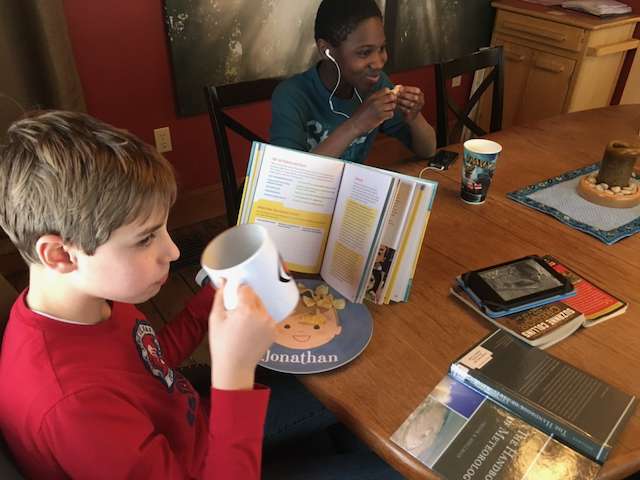
Interests – Everything Else! This is where we dove into my own interests, family priorities like Bible, and the interests of the children. This is what we emphasized the most during this age range.
Teen Schooling (ages 13+)
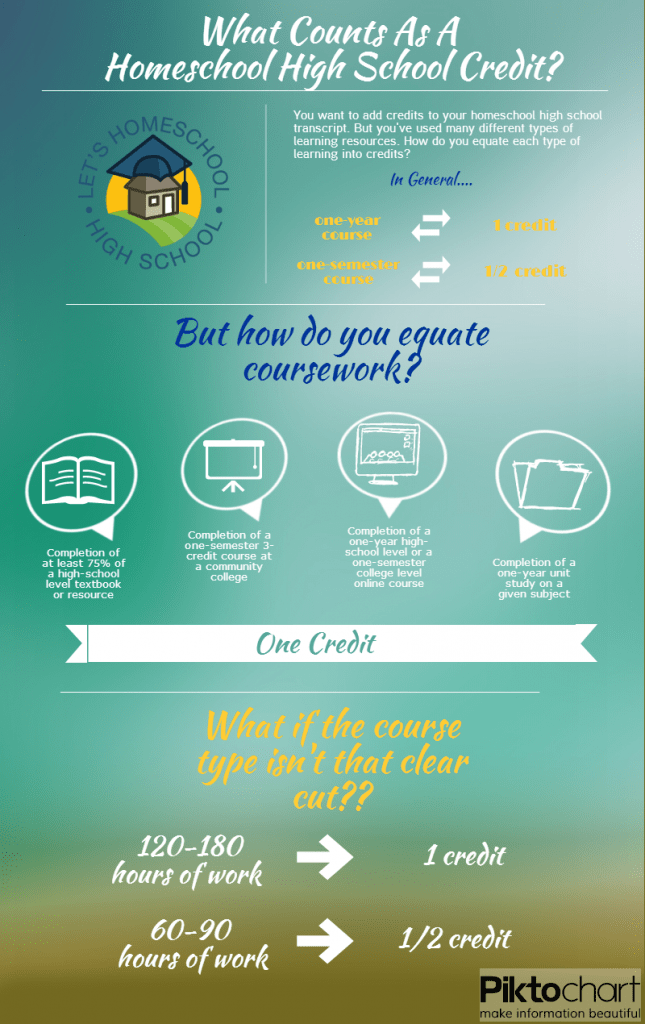
Don’t be afraid of homeschooling middle or high school! Generally speaking, 120 hours spent on a subject (including a student’s personal reading, documentaries, online courses, and formal work) or 75% of a textbook completed equals one credit.
Once you get familiar with the process, it’s not scary, and sites like FastTranscripts.com make it a breeze to quantify your teen’s learning in a way that colleges can understand.
Our family’s homeschooling goal during the teen years has always been to meet the minimum requirements for graduation, and then allow tons of extra time to pursue areas of interest and passion!
Language Arts – Here are some of the resources that worked well for us, which we adapted to each child’s interest level and ability:
- Sonlight (literature/history/Bible)
- TJEd High (online mentoring in literature and leadership)
- Wordsmith Craftsman (after searching for AGES, this thin guide contains everything your high schooler needs in order to write well!)
- All About Spelling – We only taught spelling after age 10+, when I could tell whether or not my children were natural spellers. At older ages they progressed quickly and were motivated, too.
- Grammar: Both Fix It Grammar and Life of Fred Language Arts worked well for us!
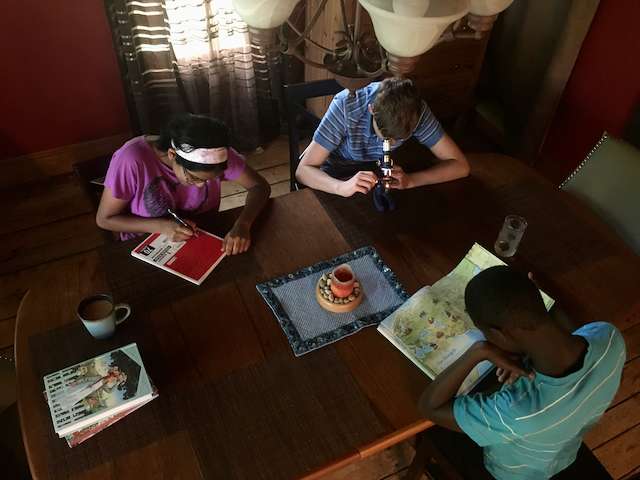
Math – Using online resources for math allowed me to outsource this subject, which I loved! We mainly used Teaching Textbooks as a key component in our homeschooling 101.
Science – We tried a variety of higher level science options, but the best fit for us ended up being the courses from All in One High School. (Bonus: They’re FREE!!!) We loved it because it was self-sufficient for my child to complete on his own, and was just right for a student who needs a solid overview of the subject but isn’t planning to go into a science-related field.
If your student might want to explore a STEM-related field in their future, the online STEAM classes from My Fun Science are highly reputable and recommended!
PE/Health – Our outdoor wilderness school, C25K and Calm apps, and a basic health textbook
Foreign Language – A combination of Duolingo, All in One Spanish, and private tutoring worked perfectly for us!
History – Sonlight, lots of reading (both fiction and non-fiction), Big Fat Notebooks, and the occasional workbook
Current Events – Watching and discussing CNN10 and The World from A to Z led to incredible discussions over the years (sometimes we still watch and discuss these together!)
Electives: This is where teens can focus on areas of interest – it’s where homeschoolers can thrive in ways that teens in traditional school just don’t have the hours for!
Also use electives to focus on your family priorities, like Bible Study, Life Skills, etc. Some of the specialized courses we created for my high schoolers included Drawing, Music Theory, Film Studies, Animation, Lighting Design Technology, and more.
We have seen this interest-led approach go on to serve the children well as they continue to slowly enter their post-homeschooling phase of life. When Jonathan applied to colleges for Lighting Design, he was told that his current level of skill was already similar to that of a college graduate in the field, so they weren’t sure he would “fit in.”
He appreciated their candor and opted out! (Though he did get in to both places he applied.)
Instead of college, he ended up getting hired by a variety of A-list celebrities within a year of high school graduation, and is currently touring worldwide with various artists.
This was never our intention, plan, or goal when we let him pursue his interest through high school, but it is remarkable to see that what one does for love and interest can go on to translate into a satisfying work life!

I hope this list has served as a helpful Homeschooling 101 for you – simplifying your thinking about what to teach and when to teach it!
When we lean into the freedom and flexibility homeschooling has to offer, we can craft a beautiful and highly individualized education that suits each child best, and sets them up well for wherever life may take them.
* Read more of Jamie’s popular posts on Simple Homeschool here.
What’s Your Homeschool Mom Personality? Take Jamie’s quiz now and receive a free personality report to help you organize your homeschool based on what your personality type needs most!
This post contains affiliate links, which means my family receives a commission off certain links.

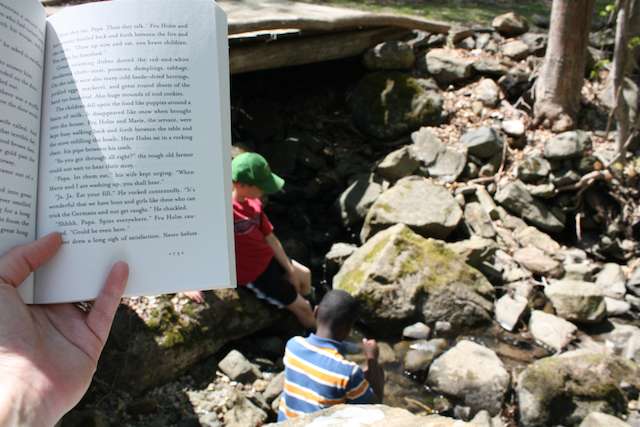
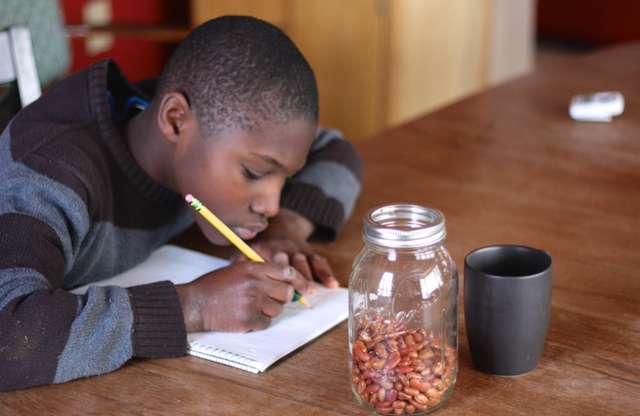
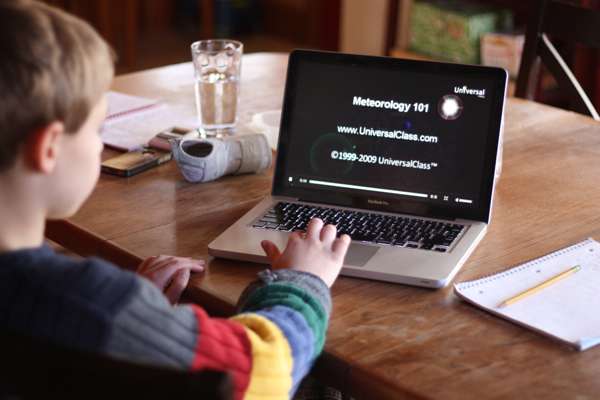
 Share your homeschool day in the life with us – one last time!
Share your homeschool day in the life with us – one last time!
Yes! This is exactly what I thought must exist somewhere but haven’t found anywhere else! Thank you. So clear and straightforward. I love your two simple age categories, and how often you emphasise “waiting to formalise” in the younger stage. As someone who enjoys planning and completing, I can get ahead of myself and it’s helpful to have the reminder to hold back on formal curriculum when they’re still in the playing-to-learn stage.
I’m so glad you found it helpful, Hannah!
Thank you Jamie! This helps as we are charting off into new territory homeschooling our teen son. He is a wonderful creative artist and he has reading challenges. He currently is in a small public charter school since kindergarten. This school has art in the curriculum from K-8 lots of recess and close partnerships between teachers-students-parents. My son has a great relationship with his special ed teacher. But when high school hits all that will change and we believe that home school is how we can meet his talents, interests, challenges, and influences best. Thanks for always letting us learn from your successes and challenges. I have read your work and felt your online support dating back to Simple Mom days. I am hoping your new venture with Homeschooling with Purpose can coach those of us who are newly venturing into home school high school
You’re so welcome, Tracy! Thank you for your kind words and long-term support, and I can’t wait to see you over at Homeschooling with Purpose this summer–I think it will be exactly what you’re looking for! xo
This is exactly why I love you Jamie! SO helpful! My oldest daughter is only just turned 4, but because I’m a planner I found you through a friend when my oldest was a baby and have read pretty much everything you’ve ever written since then! You (and the other writers on this site) have given me such peace & confidence about homeschooling and following an approach that works for us, even if it’s different than how others homeschool. I’ve shared this with several friends who also found it helpful! Thank you for sharing your journey over the years!
Oh, this is just music to my ears, Rebecca–so pleased to hear that this space has brought peace your way! xo
Yes! Oh how I needed this 3 years ago! And can still very much use this wisdom now, as my youngest is 5 and will have a completely differerent homeschool approach than I did before. Love the no rush message, and reminder to let them learn through play:)
So thrilled to hear that it was a help, Rachel!
So very helpful, especially for the high school years. I find myself so worried that I am not covering things well or doing enough.
I know that fear well, Crystal. So glad this was a help!
Hi Jamie
My name is Julia and I am a sophomore at the University of Delaware. I have a school research paper assignment in which I have to compare home school vs. traditional school. Would you be able to give me a brief description as to why you feel home schooling is more advantageous to students rather than traditional school. What are some of the pros and cons of each? Also if there is a way for me to contact some other people you know of who would like to comment as well. I would greatly appreciate it! Thank you!
Hi Julia! I’d encourage you to join some popular homeschooling groups on Facebook and ask your questions there so you can get a wider range of responses. Wishing you all the best with your research!
Thank you so much for this post! I had felt confident but then that awful doubt monster was creeping in. I was beginning to think well maybe I should just buy a boxed curriculum to make sure I was doing “enough”. I was really having a bit of confusion and insecurity take over but then I read this, and you reminded me that I’m doing just fine. Homeschool is NOT school at home, so hard to shake the programming I didn’t know I had.
Thank you again for sharing just the words I needed to read at this moment.
Thank you so very much for this article. It is exactly what I needed right now.